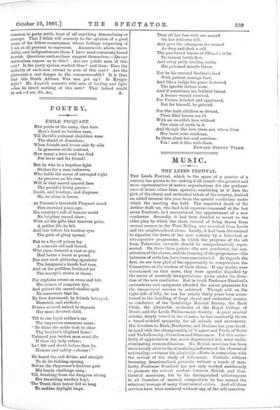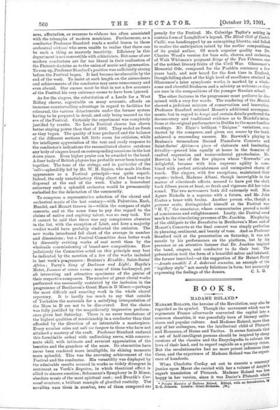MUSI C.
THE LEEDS FESTIVAL.
THE Leeds Festival, which in the space of a quarter of a century has grown to be—taking it all round—the greatest and most representative of native organisations for the perform- ance of music other than operatic, combining as it does the pick of the choral and orchestral talent of the country, derived an added interest this year from the special conditions under which the meeting was held. The regretted death of Sir Arthur Sullimn, who had held supreme command at the last seven Festivals, had necessitated the appointment of a new conductor. Secondly, it had been decided to revert to the older plan by which the choir, instead of being drawn from several centres in the West Riding, was recruited from Leeds and the neighbourhood alone. Lastly, it had been determined to signalise the dawn of the new century by a historical or retrospective programme, in which the progress of the art from Palestrina. onwards should be comprehensively repre- sented. On these three points—the new conductor, the con- stitution of the chorus, and the framing of the programme—the batteries of criticism have been concentrated. As regards the first, we are very glad of the opportunity to congratulate the Committee on the wisdom of their choice. If any doubts were entertained on that score, they were speedily dispelled by the series of masterly interpretations given under the direc- tion of the new conductor. But in truth Professor Stanford's antecedents and equipment afforded the surest guarantee for the unequivocal success he achieved. Though still on the right side of fifty, he has for nearly thirty years been accus- tomed to the handling of large choral and orchestral masses, as conductor of the Cambridge Musical Society, the Bach Choir, the admirable orchestra of the Royal College of Music, and the Leeds Philharmonic Society. A great musical scholar, deeply versed in the classics, he has constantly shown a broad-minded sympathy for all schools and movements. His devotion to Bach, Beethoven, and Brahms has gone hand- in-hand with the championship of Wagner and Verdi, of Bolts and Tschaikowsky, Cornelius and Glazounow. Yet this catho- licity of appreciation has never degenerated into mere undis- criminating cosmopolitanism. No British musician has been more keenly alive to the stimulating influence of the element of nationality,—witness his 'admirable efforts in connection with the revival of the study of folk-music. Catholic without becoming denationalised, patriotic without a touch of insu- larity, Professor Stanford has not only worked assiduously to promote the entente cordials Letween British and Con- tinental musicians, but by his distinguished achievements in all branches of musical composition he has earned the reluctant homage of many Continental critics. And all these services have been rendered without any of the self-assertive
nese, affectation, or recourse to siclame too often associated with the triumphs of modern musicians. Furthermore, as a conductor Professor Stanford reads a useful lesson to those orchestral virtuosi who seem unable to realise that there can be such a thing as masterly inactivity. Efficiency in this department is not convertible with athleticism. But some of our modern conductors are far too literal in their realisation of the Platonic doctrine as to the union of music and gymnastics.
To sum up, Professor Stanford's position was sufficiently strong before the Festival began. It had become invulnerable by the end of the week. To insist at such length on the antecedents and achievements of the conductor may seem unnecessary and even absurd. Our .excuse must be that in not a few accounts of the Festival his very existence seems to have been ignored.
As for the singers, the substitution of a Leeds for a West Riding chorus, regrettable on many accounts, affords an immense countervailing advantage in regard to facilities for rehearsal, the various detachments under the former system having to be prepared in detail, and only being massed on the eve of the Festival. Certainly the experiment was completely justified by results. No Leeds Festival chorus has shown better staying power than that of 1901. They ended as fresh as they began. The quality of tone produced and the balance of the different sections left little room for criticism, while for intelligent appreciation of the text and ready response to the conductor's indications the reconstituted chorus outshone any body of singers heard on corresponding occasions in the last dozen years. Even higher praise can be awarded to the band. A finer body of British players has probably never been brought together. The tone of the strings, and in particular of the 're/A—splendidly led by Mr. W. H. Squire, who made his first appearance as a Festival principal—was quite superb. Indeed, the only unsatisfactory thing about the band was its dispersal at the end of the week. Under a benevolent autocracy such a splendid orchestra would be permanently embodied for the delectation of the community.
To compress a representative selection of the choral and orchestral music of the last century—with Palestrina, Bach, Handel, and Mozart thrown in—within the compass of eight concerts, and at the same time to pay due regard to the
elainis of native and aspiring talent, was no easy task. Yet it cannot be said that there was any conspicuous absentee
in the list, with the exception of Liszt, and here a majority verdict would have probably vindicated the omission. The new works introduced fell short of the average in number and dimensions ; but a Festival Committee does better work by discreetly reviving works of real merit than by the wholesale commissioning of brand-new compositions. How judiciously the Committee acted on this principle may best
be indicated by the mention of a few of the works included in last week's programme: Brahms's Rinaldo ; Saint-Saens' Africa ; Parry's Song of Darkness and Light; Haydn's Motet, Insanae et vanae curae ; none of them hackneyed, yet all interesting and attractive specimens of the genius of
their respectire composers. The number of great choral works performed was necessarily restricted by the inclusion in the programme of Beethoven's Great Mass in D Minor,—perhaps the most difficult and exacting work in the whole choral repertory. It is hardly too much to say that outside of Yorkshire the materials for a satisfying interpretation of the Mass in D are not to be discovered. But the choice
was fully justified by the magnificently impressive perform- ance given last Saturday. There is no surer touchstone of the highest qualities of musicianship in a conductor than that afforded by the direction of so intractable a masterpiece. Every number cries out noli me tangere to those who have not
attained a mastery of the craft. Professor Stanford endured this formidable ordeal with unflinching nerve, with consum- mate skill, with intimate and reverent appreciation of the beauties and the grandeur of the score. Its obscurities have never been rendered more intelligible, its shining moments more splendid. This was the crowning achievement of the
Festival and the conductor. His versatility was displayed by the admirable results secured in works so widely divergent in sentiment as Verdi's Requiem, in which theatrical effect is allied to sincere emotion ; Schumann's Symphony in D Minor, absolute music of the most spiritual cast; and Dvorik's Car- neval overture, a brilliant example of glorified rusticity. The novelties were threi3 in number, two of them composed ex. pressly for the Festival. Mr. Coleridge Taylor's setting in cantata form of Longfellow's legend, The Blind Girl of Castel. CuiW, was handicapped by an uninspiring libretto, and failed to realise the anticipation raised by the earlier compositions of its genial author. Of much superior quality was Dr. Charles Wood's version for bass solo, chorus, and orchestra of Walt Whitman's poignant Dirge of the Two Veterans, one of the noblest literary fruits of the Civil War. Glazounow's Memorial Ode, composed for the Pushkin centenary a few years back, and now heard for the first time in England though falling short of the high level of excellence attained in Glazounow's later symphonic works, is marked by a whole- some and cheerful freshness and a sobriety as welcome as they are rare in the compositions of the younger Russian school.
The other features in the programme must perforce be dis. missed with a very few words. The rendering of the Messiah showed a judicious mixture of conservatism and innovation. Professor Stanford retained Mozart's additional accompani- ments, but in regard to tempi and certain details preferred the documentary and traditional evidence as to Handers inten- tions at the original performance in Dublin to the more familiar readings. Mr. Elgar's brilliant " Enigma " variations, con- ducted by the composer, and given con amore by the band, achieved• a resounding success. Mr. Borwiek's playing in Brahms's tremendous Second Pianoforte Concerto and Saint-Saens' Africa—a piece of elaborate and fascinating frivolity—proved him equally at home in the domains of exalted expression and transcendental pyrotechnics. Mr. Borwick is 'one of the few players whose "fireworks are delightful, because with him supreme agility is com- bined with perfect articulateness and unimpaired charm of touch. The singers, with few exceptions, maintained their repute ;- indeed, Madame Albani, though incorrigible in the matter of ritardando effects, seemed to have put the clock back fifteen years at least, so fresh and vigorous did her voice sound. The two newcomers both did extremely well. Miss Agnes Nicholls is a soprano with a future, and Mr. John Coates a tenor with brains. Another person who, though a persona mute, distinguished himself at the Festival was "H. T.," the annotator, whose commentaries proved a model of conciseness and enlightenment. Lastly, the Festival owed much to the stimulating presence of Dr. Joachim. His playing of the obbligato to the Benedict us in Beethoven's Mass and of Mozart's Concerto at the final concert was simply perfection in phrasing, sentiment, and beauty of tone. And as Professor Stanford said at the presentation on Saturday, it was not merely by his performance on the platform, but by his presence as an attentive listener that Dr. Joachim inspired the band, singers, and conductor to do their best. The presentation took the form of a beautiful salver andinkstand, the former inscribed—at the suggestion of Sir Hubert Parry —Amato wmabili J. J. dederunt amantes, an example of the lapidary style" not merely felicitous in form, but accurately
expressing the feelings of the donors. C. L. G.















































 Previous page
Previous page